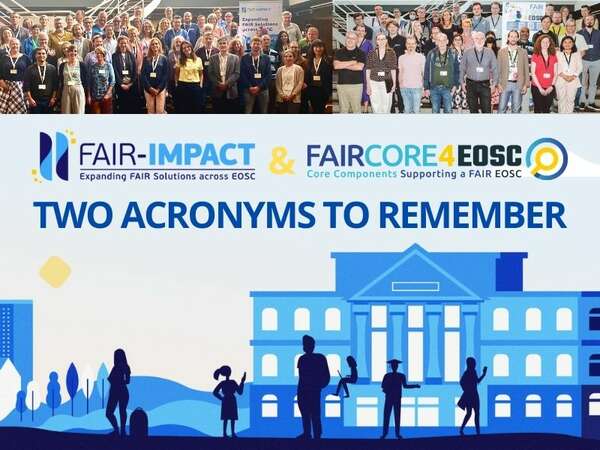
FAIR-IMPACT and FAIRCORE4EOSC, two acronyms to remember
This June 2022, two European Horizon projects kicked off in Amsterdam, FAIRCORE4EOSC and FAIR-IMPACT. Both projects will contribute to the implementation of the FAIR principles across EOSC in close collaboration with other actors in the EOSC ecosystem.
In 2015 the vision of a European Open Science Cloud (EOSC) emerged. EOSC would provide an open and trusted environment for accessing and managing a wide range of publicly funded research data and related services, helping researchers reap the full benefits of data-driven science.
EOSC is currently in its implementation phase (2021-2027) which requires active engagement and support to ensure widespread implementation and adoption of the FAIR (Findable, Accessible, Interoperable, Reusable) principles, to define and share standards and develop tools and services, to allow researchers to find, access, reuse and combine research results.
The FAIRCORE4EOSC and FAIR-IMPACT projects will support the realisation of this web of FAIR data and services by delivering new core infrastructure components as well as by supporting the implementation of FAIR-enabling practices, tools, and services.
If we want to solve the societal challenges of today, we need cross-domain research that tries to understand complex systems. This means we need data that are sufficiently documented, contextualised, appropriately licensed, and interoperable.
We know that only one out of five European researchers puts the FAIR principles into practice, and the data in European repositories are not yet as FAIR as we would like them to be. FAIR-IMPACT aims to improve this situation by providing new FAIR solutions across domain and research outputs that will enable the researchers to make their data FAIR.
Ingrido Dillo, FAIR-IMPACT Project Coordinator
Significant advances are made to collect and harmonise metadata on software source code, allowing the Finding, Accessing and Reuse of source code relevant to science. The Metadata Schema and Crosswalk Repository facilitates the exchange of metadata between repositories “speaking in different metadata schemas”, thereby advancing FAIR. The Data Type Repository focuses on the concrete data types, giving them PIDs for referencing in linked data and genuinely creates Interoperability by providing conversions between compatible data types.
These concrete services help in making different types of research objects more FAIR, and form concrete building blocks for making the Minimum Viable EOSC a reality.
Tommi Suominen, FAIRCORE4EOSC Project Coordinator